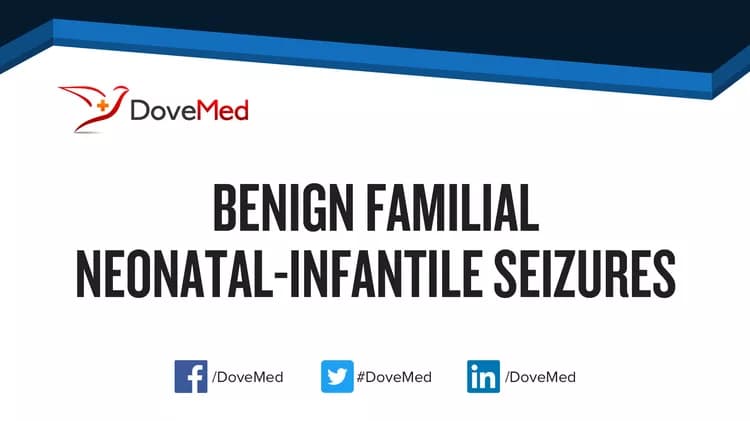What are the other Names for this Condition? (Also known as/Synonyms)
- Benign Familial Infantile Convulsions
- Benign Familial Neonatal Convulsions
- Benign Familial Neonatal-Infantile Epilepsy
What is Benign Familial Neonatal-Infantile Seizures? (Definition/Background Information)
- Benign Familial Neonatal-Infantile Seizures (BFNIS) is a benign familial epilepsy syndrome with an intermediate phenotype between benign familial neonatal seizures (BFNS) and benign familial infantile seizures (BFIS)
- So far, this syndrome has been described in multiple members of 10 families. Age of onset in these BFNIS families varied from 2 days to 6 months, with spontaneous resolution in most cases before the age of 12 months
- Like BFNS and BFIS, seizures in Benign Familial Neonatal-Infantile Seizures generally occur in clusters over one or a few days with posterior focal seizure onset
- Benign Familial Neonatal-Infantile Seizures is caused by mutations in the SCN2A gene (2q24.3), encoding the voltage-gated sodium channel alpha-subunit Na(V)1.2. Transmission is autosomal dominant
(Source: Benign Familial Neonatal-Infantile Seizures; Orphanet, National Institute of Health and Medical Research (INSERM), Paris.)
Who gets Benign Familial Neonatal-Infantile Seizures? (Age and Sex Distribution)
- Benign Familial Neonatal-Infantile Seizures is a rare congenital disorder. The presentation of symptoms may occur at birth and in infancy
- Both males and females may be affected
- Worldwide, individuals of all racial and ethnic groups may be affected
What are the Risk Factors for Benign Familial Neonatal-Infantile Seizures? (Predisposing Factors)
- A positive family history may be an important risk factor, since Benign Familial Neonatal-Infantile Seizures can be inherited
- Currently, no other risk factors have been clearly identified for this condition
It is important to note that having a risk factor does not mean that one will get the condition. A risk factor increases one’s chances of getting a condition compared to an individual without the risk factors. Some risk factors are more important than others.
Also, not having a risk factor does not mean that an individual will not get the condition. It is always important to discuss the effect of risk factors with your healthcare provider.
What are the Causes of Benign Familial Neonatal-Infantile Seizures? (Etiology)
- Benign Familial Neonatal-Infantile Seizures is caused by mutation(s) in the SCN2A gene
- This gene codes for voltage-gated sodium channel alpha-subunit Na(V)1.2
- The condition is inherited in an autosomal dominant manner
Autosomal dominant inheritance: Autosomal dominant conditions are traits or disorders that are present when only one copy of the mutation is inherited on a non-sex chromosome. In these types of conditions, the individual has one normal copy and one mutant copy of the gene. The abnormal gene dominates, masking the effects of the correctly function gene. If an individual has an autosomal dominant condition, the chance of passing the abnormal gene on to their offspring is 50%. Children, who do not inherit the abnormal gene, will not develop the condition or pass it on to their offspring.
What are the Signs and Symptoms of Benign Familial Neonatal-Infantile Seizures?
The signs and symptoms of Benign Familial Neonatal-Infantile Seizures may include:
- Cyanosis
- Dialeptic seizures
- Focal seizures
- Focal seizures, afebrile
- Normal interictal EEG
- Generalized tonic-clonic seizures with focal onset
(Source: Benign Familial Neonatal-Infantile Seizures; Genetic and Rare Diseases Information Center (GARD) of National Center for Advancing Translational Sciences (NCATS), USA.)
How is Benign Familial Neonatal-Infantile Seizures Diagnosed?
Benign Familial Neonatal-Infantile Seizures is diagnosed on the basis of the following information:
- Complete physical examination
- Thorough medical history evaluation
- Assessment of signs and symptoms
- Laboratory tests
- Imaging studies
- Biopsy studies, if necessary
- Molecular genetic testing for checking for or confirm causative gene mutation(s)
Many clinical conditions may have similar signs and symptoms. Your healthcare provider may perform additional tests to rule out other clinical conditions to arrive at a definitive diagnosis.
What are the possible Complications of Benign Familial Neonatal-Infantile Seizures?
The complications of Benign Familial Neonatal-Infantile Seizures may include:
- Poor feeding
- Poor growth
Complications may occur with or without treatment, and in some cases, due to treatment also.
How is Benign Familial Neonatal-Infantile Seizures Treated?
There is no cure for Benign Familial Neonatal-Infantile Seizures, since it is a genetic condition. The treatment is usually given to manage the signs and symptoms and any complication that develops.
How can Benign Familial Neonatal-Infantile Seizures be Prevented?
Currently, Benign Familial Neonatal-Infantile Seizures may not be preventable, since it is a genetic disorder.
- Genetic testing of the expecting parents (and related family members) and prenatal diagnosis (molecular testing of the fetus during pregnancy) may help in understanding the risks better during pregnancy
- If there is a family history of the condition, then genetic counseling will help assess risks, before planning for a child
- Active research is currently being performed to explore the possibilities for treatment and prevention of inherited and acquired genetic disorders
Regular medical screening at periodic intervals with tests and physical examinations are recommended.
What is the Prognosis of Benign Familial Neonatal-Infantile Seizures? (Outcomes/Resolutions)
- The prognosis of Benign Familial Neonatal-Infantile Seizures is dependent upon the severity of the signs and symptoms and associated complications, if any
- The seizures predominantly occur in the first two years of life; no lingering effects are observed once seizures stop
Additional and Relevant Useful Information for Benign Familial Neonatal-Infantile Seizures:
The following DoveMed website link is a useful resource for additional information:
Related Articles
Test Your Knowledge
Asked by users
Related Centers
Related Specialties
Related Physicians
Related Procedures
Related Resources
Join DoveHubs
and connect with fellow professionals


0 Comments
Please log in to post a comment.